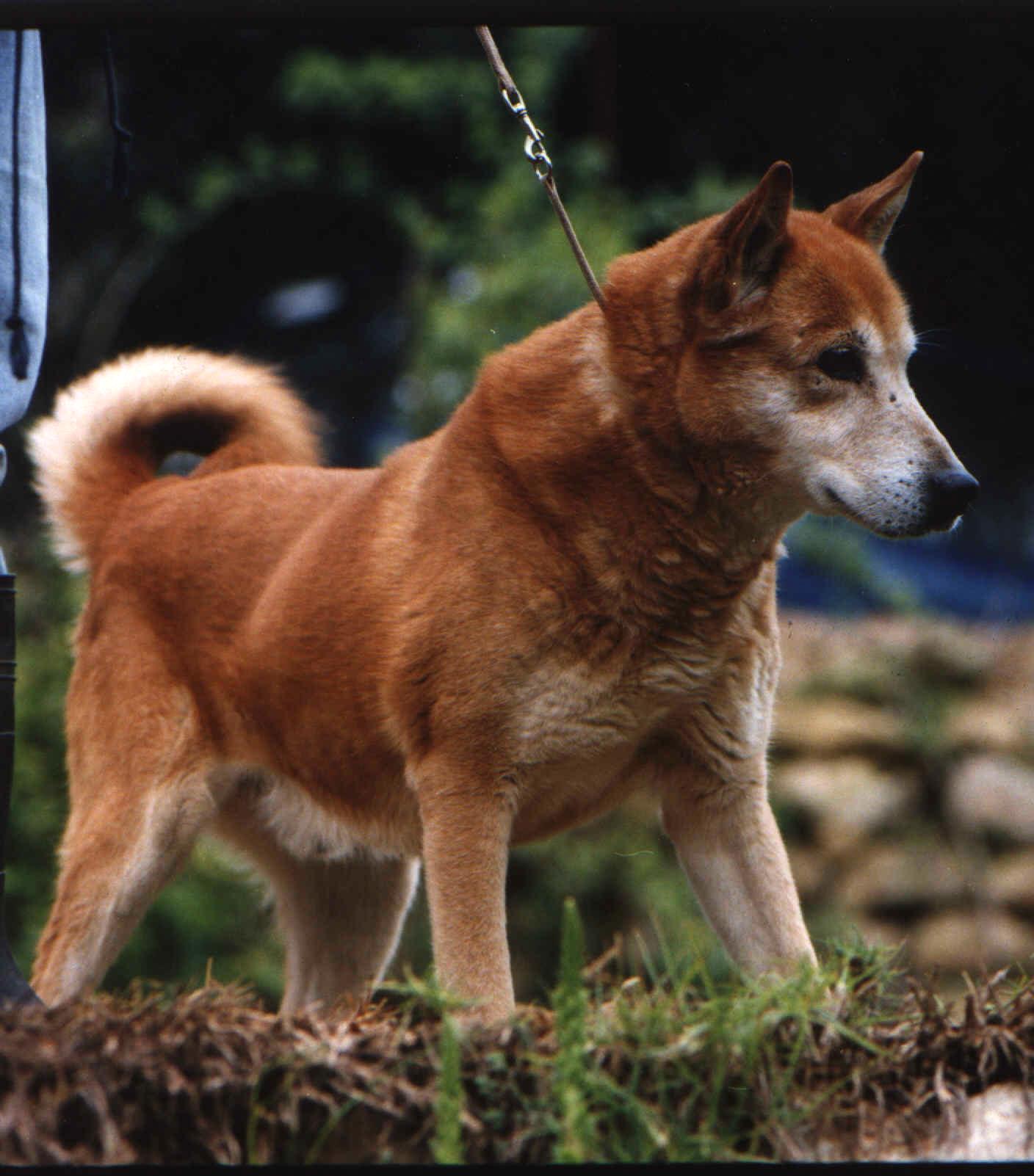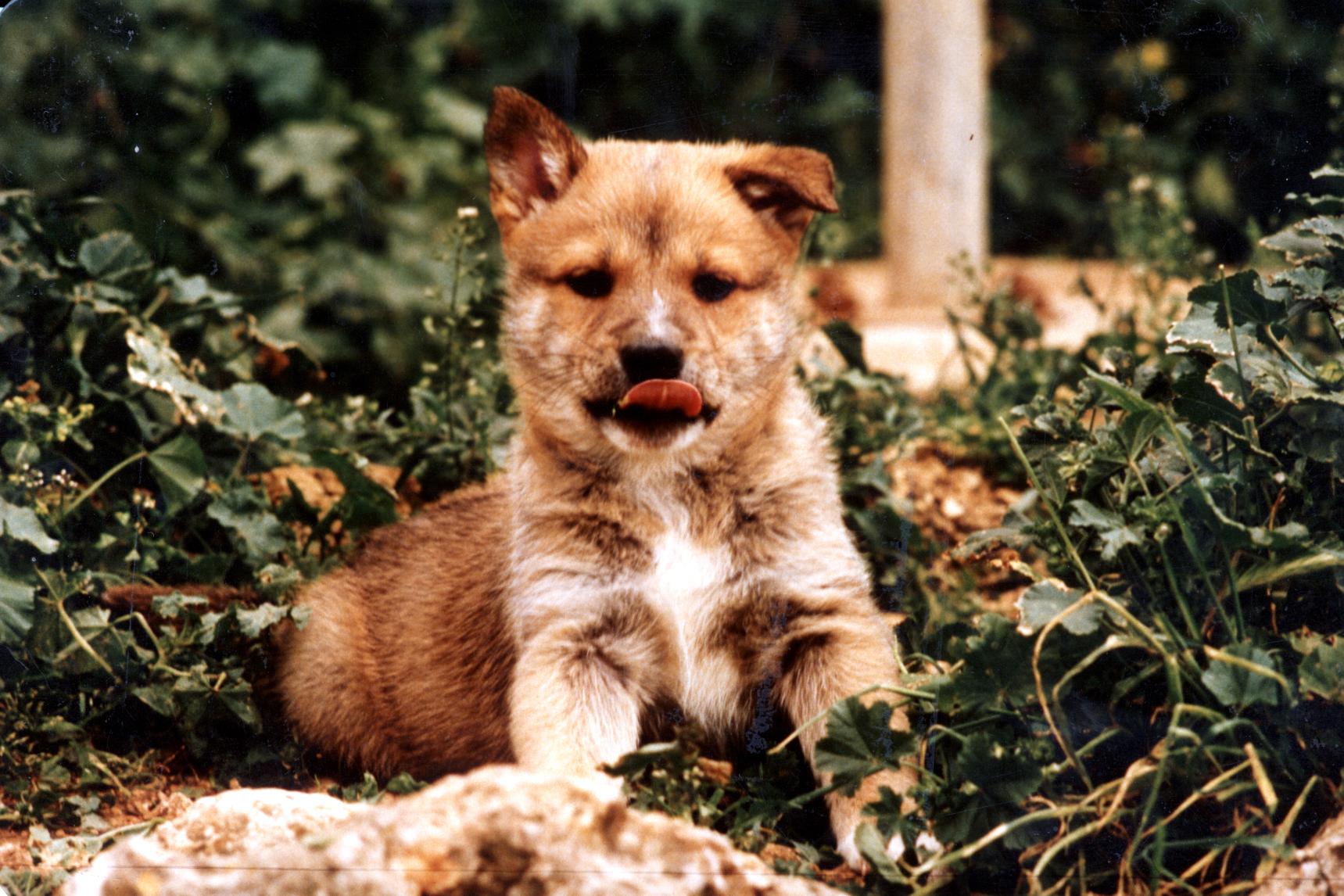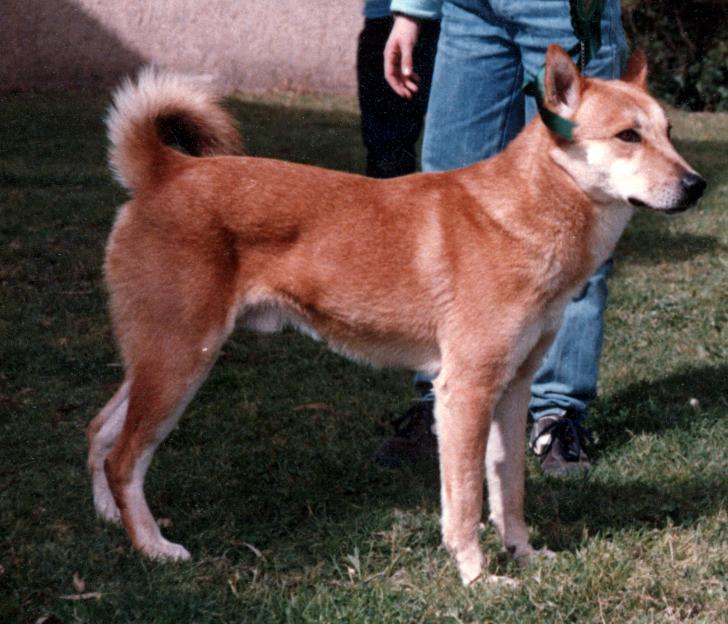|
We were always on the outlook for new breeding stock. The Bedouin had many lovely dogs, but it was a real problem trying to get anything from them. We did get puppies on several occasions, but few of them grew up to be exactly what we were looking for
- it is very hard to look at a five or six week old puppy and to know for sure what it will be as an adult. So, in order to increase the gene pool and bring in some new blood, after several years of breeding, we
came up with a new idea - we would travel down to the desert with a bitch in season and breed her to the best Bedouin male
we could find.
The bitch selected for this great experiment was Hava (Lahava me Shaar
Hagai, litter sister to Ch. Lapid). When she came in season, I got in touch with
a friend of ours who lived in the south, in Arad. Marvin was a biology
teacher and had been the chief biologist of the southern region for the Israel Nature Reserves Authority, as well as being
a dog man himself. He knew the Bedouin well, and was very familiar with all the
roads and tracks in the area.

|
| Yitz at 13 years |
I was looking forward to the
trip. It was winter, and in our area it was cloudy, cold and rainy. I was looking forward to the warm desert sun.
The drive took about two hours, and what a difference it is driving south, and not in the busy traffic of the Tel Aviv\Jerusalem
area! The roads may not be as good, but you can drive along sometimes rarely
seeing another car.
It was sunny in Arad, but there
were clouds moving up, and it was not very warm. Oh well, so much for enjoying
the desert sun!
We took the road out of Arad in the direction of Massada. This is the side of Massada without access to the fortress on top.
The road is almost untraveled except for Bedouin returning to their camps. There
was absolutely nothing there at this time of year - December - not even a blade of grass or the slightest touch of greenery
was apparent, only barren hillside covered with loose rocks. Everything was gray
and brown and nothing alive was visible until you came over a rise and suddenly found a concealed Bedouin camp.
The Bedouin in this area still lived in tents in very traditional style, not in the tin shantytowns that had
begun to spring up in much of the south. However, the area was so barren that
the Bedouin had trouble finding enough feed for their flocks, and many of the adult men of the tribes would work in Arad as
watchmen or in construction work, a good portion of their earnings going to buy feed for the sheep and goats. To the Bedouin, their tradition was very important, and even though keeping their livestock was, sometimes,
not profitable, they were not willing to give up this way of life. Even in the
shantytowns, we had often seen the traditional tent pitched in the yard outside of the government provided house, and the
house being used, in part, as a shelter for the animals. For the most part, we
found only teenagers and children in the camps; the women usually stayed out of sight.
The only redeeming part of this
bleak landscape - which in its own harsh and unforgiving way is very beautiful - was the sight of the Dead Sea through the
hills. The only thing to remind us that we were in the modern world was the sight
of the apartment buildings of Arad in the distance.
There were many dogs. All the Bedouin camps had at least three or four. Some of
them were out with the flocks. All of the Bedouin mentioned that there was a
lot of trouble with predatory wolves, and that the dogs were very necessary to protect the flocks.
We saw a number of very good-looking
dogs, but none were exactly what I was looking for. Most of them had cut ears
- the Bedouin cut the ears of their watchdogs as they feel that it makes them more alert, and also that then they are less
vulnerable in fights. So it was impossible to tell if these dogs had standing
ears or not.


|
 |
|
|
|
 |
|
We decided to try another area, and drove over to the other
side of Arad, near the garbage dump, to look for more dogs.
Garbage dumps are favored haunts of Bedouin dogs - they
find it necessary to eke out their diet with scavenging and hunting. The Bedouin
are not generous with the food they provide for their dogs, expecting them to take care of themselves. So it was common to find numbers of Bedouin dogs checking out the pickings there.
As we drove in to the dump, we spotted three dogs - a beautiful
black and white bitch, a cream colored dog with a longish coat, and a magnificent red and white male of ideal type. That was the one! We stopped and I started to pull Hava out
of the car, but the dogs didnt wait to see what was happening - they trotted off across the desert.
The great chase began.
We tried to find tracks (in most places, a track through the desert was where one set of tire tracks, usually of a
Bedouin pick-up truck, had at some previous time passed) going in the direction that the dogs were going. We spotted the dogs again and tried to get ahead of them - I figured that if I could get in front of them
with Hava, maybe they would stop to check her out. No such luck - the bitch paused
to bark at us, but then they ran on, with me running after them with Hava. She
didnt understand what the purpose of this chase was either - she would have preferred to stop and check out all the strange
and fascinating smells.
Suddenly, I came to the top of a rise, and there below
me was a Bedouin camp. This was the goal of the dogs - they had settled down
in the center of the camp.
I left it up to Marvin, who had
caught up to me in the jeep, to try to explain to the Bedouin why anyone should bother bringing a bitch to breed to one of
their dogs. They found this a very strange idea, but had no objections - it certainly
provided a break in the day to day routine. The male, however, was another story. Bedouin dogs manage their sex life very much on their own, and this dog was very suspicious
of strangers appearing with a bitch in season and expecting him to do something about it in front of an audience. When he finally became interested enough to come over and inspect Hava, she clearly showed that she was
not about to carry on with a total stranger!
It was getting towards dark and
it was bitterly cold and windy (so much for the sunny, warm desert!) But there
was nothing to do but wait for the dogs to get acquainted - they had to go through the entire routine of sniffing, playing,
testing dominance, chasing away other interested dogs, and finally getting down to business.
The breeding took place successfully, and then the tie lasted for forty-five minutes - highly successful from a breeders
standpoint, but from my standpoint, I wasnt sure that I wouldnt freeze to death before they finished.
While we were waiting, the Bedouin
boys told us that they had had a lot of trouble with wolves, and that last year their dogs had killed a wolf that came into
the camp and stole a lamb. They also had had the mother and father of our stud,
both of whom, they said, were excellent dogs, the sire red and bigger than his son, the dam cream colored. However, the Nature Reserves people during a rabies control crackdown had killed them, which had been very
upsetting to the tribe. As the story of the wolf showed, these people valued
their dogs. They now made sure to keep all their dogs vaccinated against rabies
and to keep the vaccination certificates on hand.
By the time that the breeding
was completed, it was pitch dark. Finding our way out of the desert was an experience
- tracks that are hardly visible during the day are totally invisible at night. All
there was to guide us was the lights of Arad in the distance, and Marvins familiarity with the desert. Every now and then there was the flash of the eyes of some animal - fox, jackal or even wolf - caught in
the headlights of the car.
The two-hour drive home was a
much longer two hours than the drive down, but I had a successful day behind me. The
result, after two months, was a lovely litter of five puppies - all males!
Dorcas, my daughter, was grandmother
for these puppies, and when the time came for them to go to new homes, it was obvious that one would stay with us. Dorcas chose the one she chose was a red boy who was named Yitzhar.
Yitzhar grew into a very impressive
dog. While some of the Canaans have very sweet faces and expressions, Yitz had
a wolfish look no one could look at him and mistake the fact that he was close to the wild.
But he was extremely affectionate to us, and very protective. He also
was a good working dog, very willing to learn. Like most Canaans, though, he
had a mind of his own. Repetitive exercises bored him, and he would clearly show
that he was fed up. There were also a few things that he considered beneath his
dignity, and one of those things was retrieving. If he were sent to retrieve
a dumbbell, he would walk out to the spot where the dumbbell was lying, sniff it, look at me with disgust, turn around and
pee on the dumbbell and walk away. It was very clear what he thought about the
whole thing!
Yitzhar became a champion, an
experienced European traveler, and also a movie star
|
 |
|
|
|

